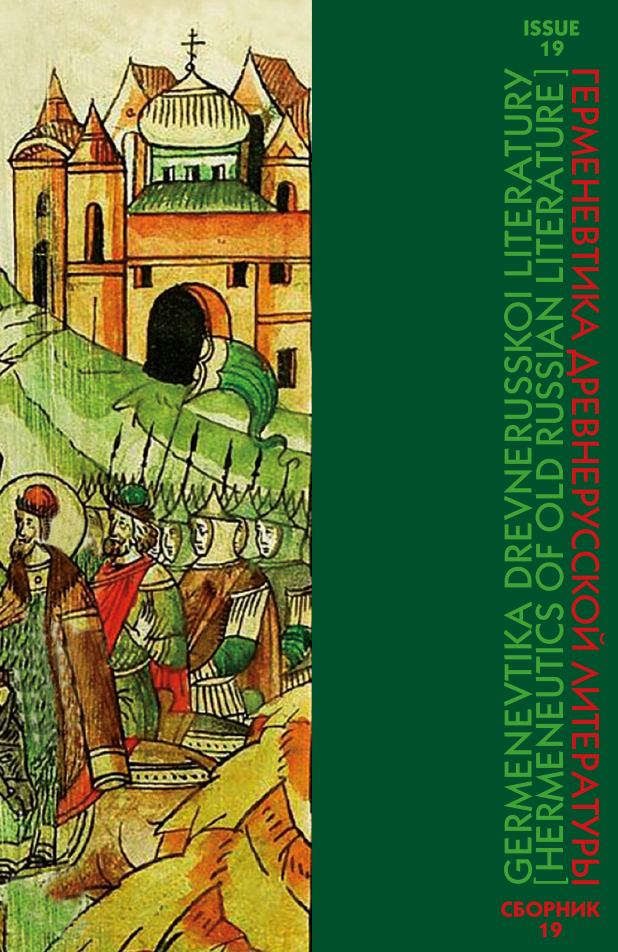Abstract:
The article examines the consideration and functioning of biblical quotations and images in the unpublished Holy Word to the Moscow Metropolitans Peter, Alexy and Jonah by Prince S.I. Shakhovskoy, which is in the collection of prince’s works (RDM RSL, f.173.1, no. 231, ll. 213–267). Prince S.I. Shakhovskoy actively used extensive quotations from the Holy Scriptures in the monument dedicated to the Moscow saints. This circumstance is dictated by the intention of the work — educational and didactic. Biblical quotations of commendable word (prelates Peter, Alexy and Jonah are presented to readers as saints of God, scribes depict the spiritual qualities of monument heroes), it can be introduced into the text and indicating the source (or author) and without it, exactly or with a change in the quote form, as well as a paraphrase. All biblical quotations and analogies that are found in the text are intended to glorify the saint and enhance the emotional coloring of author’s speech. As it was traditional in Old Russian texts, biblical borrowings are used by author to narrate events and explain their course, to depict characters in a laudatory word, and also to enhance the emotionality of the narration, to create an expressive and embellished language that differs from everyday speech.
REFERENCES
1 Averincev, S.S. “Drevneevreiskaia literatura” [“Hebrew Literature”]. Istoriia vsemirnoi literatury [History of World Literature], vol. 1. Moscow, Nauka Publ., 1983, pp. 271–302. (In Russian)
2 Berdnikova, T.A., Uarova, N.A. “Funktsionirovanie bibleizmov v sovremennom russkom iazyke” [“Functioning of Biblicalisms in Modern Russian”]. Sbornik trudov Iakutskoi duhovnoi seminarii [Collection of Works of the Yakut Theological Seminary], no. 2, 2015, pp. 109–119. (In Russian)
3 Gardzaniti, M. “Bibleiskie tsitaty v literature Slavia Orthodoxa” [“Biblical Quotations in the Literature of Slavia Orthodoxa”]. Trudy Otdela drevnerusskoi literatury [Proceedings of the Department of Old Russian Literature], vol. 58. St. Petersburg, Nauka Publ., 2008, pp. 28–40. (In Russian)
4 Gritskova, A.V. “Pragmaticheskie funktsii bibleizmov v razlichnykh tipakh tekstov” [“Pragmatic Functions of Biblicalisms in Different Types of Texts”]. Vysshee gumanitarnoe obrazovanie XXI veka: problemy i perspektivy: Materialy dvenadtsatoi mezhdunarodnoi nauchno-prakticheskoi konferentsii, Samara, 27– 28 sentiabria 2017 goda [Higher Humanitarian Education of the 21th Century: Problems and Prospects: Proceedings of the 20th International Scientific and Practical Conference, Samara, September 27–28, 2017]. Samara, Samara State Socio- Pedagogical University Publ., 2017, pp. 81–85. (In Russian)
5 Danilevskii, I.N. “Bibleizmy v ‘Povesti vremennykh let’.” [“Bibleisms in the ‘Tale of Bygone Years’.”]. Germenevtika drevnerusskoi literatury [Hermeneutics of Old Russian Literature]. Issue 2. Moscow, Tipografiia Ministerstva kul’tury USSR Publ., 1993, pp. 75–103. (In Russian)
6 Danilevskii, I.N. “Bibliia i Povest’ vremennykh let: K probleme interpretatsii letopisnykh tekstov” [“Bible and the Tale of Bygone Years: On the Problem of Interpreting Chronicle Texts”]. Otechestvennaia istoriia, no. 1, 1993, pp. 78–94. (In Russian)
7 Danilevskii, I.N. Povest’ vremennykh let: germenevticheskie osnovy istochnikovedeniia letopisnykh tekstov [The Tale of Bygone Years: Hermeneutic Fundamentals of Source Studies of Chronicle Texts]. Moscow, Aspekt-Press Publ., 2004. 383 p. (In Russian)
8 Dubrovina, K.N. Entsiklopedicheskii slovar’ bibleiskikh frazeologizmov [Encyclopedic Dictionary of Biblical Phraseological Units]. Moscow, Flinta Publ., 2010. 805 p. (In Russian)
9 Kirillin V.M. “Epifanii Premudryi kak agiograf Sergiia Radonezhskogo: problema avtorstva” [“Epiphanius the Wise as a Hagiographer of Sergius of Radonezh: Problem of Authorship”]. Germenevtika drevnerusskoi literatury [Hermeneutics of Old Russian Literature]. Issue 7, part 2. Moscow, Tipografiia Neftianik Publ., 1994, pp. 264–275. (In Russian)
10 Kuz’mina, M.K. Kanon prepodobnicheskogo zhitiia skvoz’ prizmu bibleiskikh tsitat [Canon of the Monk’s Vita through the Prism of Biblical Quotations]. Moscow, Vodolei Publ., 2017. 400 p. (In Russian)
11 Platonov, S.F. Drevnerusskie skazaniia i povesti o Smutnom vremeni XVII v. kak istoricheskii istochnik [Old Russian Legends and Stories on the Time of Troubles of the 17th Century as a Historical Source]. St. Petersburg, Tipografiia V.S. Balasheva Publ., 1888. 372 p. (In Russian)
12 Trofimova, N.V. “Bibleiskie tsitaty v Novgorodskoi Pervoi letopisi” [“Biblical Quotations in the Novgorod First Chronicle”]. Studia Litterarum, vol. 6, no. 4, 2021, pp. 180–197. (In Russian) https://doi.org/10.22455/2500-4247-2021-6-4-180-197
13 Trofimova, N.V. “Bibleiskie tsitaty vo Vladimiro-Suzdal’skom letopisanii XII– XIII vv.” [“Biblical Quotations in the Vladimir-Suzdal Chronicle of the 12th–13th Centuries”]. Literatura Drevnei Rusi: materialy X Vserossiiskoi konferentsii “Drevnerusskaia literatura i ee traditsii v literature Novogo vremeni”, posviashchennoi pamiati professora Nikolaia Ivanovicha Prokof ’eva, Moskva, 6–7 dekabria 2018 goda [Literature of Old Russia: Proceedings of the 10th All-Russian Conference “Old
Russian Literature and Its Traditions in the Literature of Modern Times,” Dedicated to the Memory of Professor Nikolai Ivanovich Prokofiev, Moscow, December 6–7,
2018], Moskovskii pedagogicheskii gosudarstvennyi universitet, Institut filologii. Moscow, Moscow Pedagogical State University Publ., 2019, pp. 23–44. (In Russian)
14 Trofimova, N.V. “Bibleiskie tsitaty v Kievskoi letopisi” [“Biblical Quotations in the Kievan Chronicle”]. Aksiologicheskoe prostranstvo russkoi slovesnosti: traditsii i perspektivy izucheniia: Materialy mezhdunarodnoi nauchnoi konferentsii “Kuskovskie chteniia. Aksiologicheskoe prostranstvo russkoi slovesnosti: traditsii i perspektivy izucheniia”, Moskva, 3–6 oktiabria 2019 goda [Axiological Space of Russian Literature: Traditions and Perspectives of Study: Proceedings of the International Scientific Conference “Kuskov Readings. The Axiological Space of Russian Literature: Traditions and Perspectives of Study,” Moscow, October 3–6, 2019]. Moscow, Moscow State Institute of Culture Publ., 2019, pp. 225–233. (In Russian)
15 Trofimova, N.V. “Bibleiskie tsitaty v letopisnykh voinskikh povestiakh” [“Biblical Quotations in Military Chronicles”]. Drevniaia Rus’. Voprosy medievistiki, no. 3 (69), 2017, pp. 137–150. (In Russian)
16 Turkova-Zaraiskaia, M.O. “Slovari bibleizmov” [“Biblical Dictionaries”]. Vestnik Tverskogo gosudarstvennogo universiteta. Seriia: Filologiia, no. 2, 2016, pp. 337–341. (In Russian)
17 Hudiakova, E.S. “O funktsiiakh religioznoi leksiki i bibleizmov v tekstakh sovremennykh pechatnykh SMI” [“On the Functions of Religious Vocabulary and Biblical Words in the Texts of Modern Print Media”]. Izvestiia Rossiiskogo gosudarstvennogo pedagogicheskogo universiteta im. A.I. Gertsena, no. 49, 2008, pp. 226–234. (In Russian)






